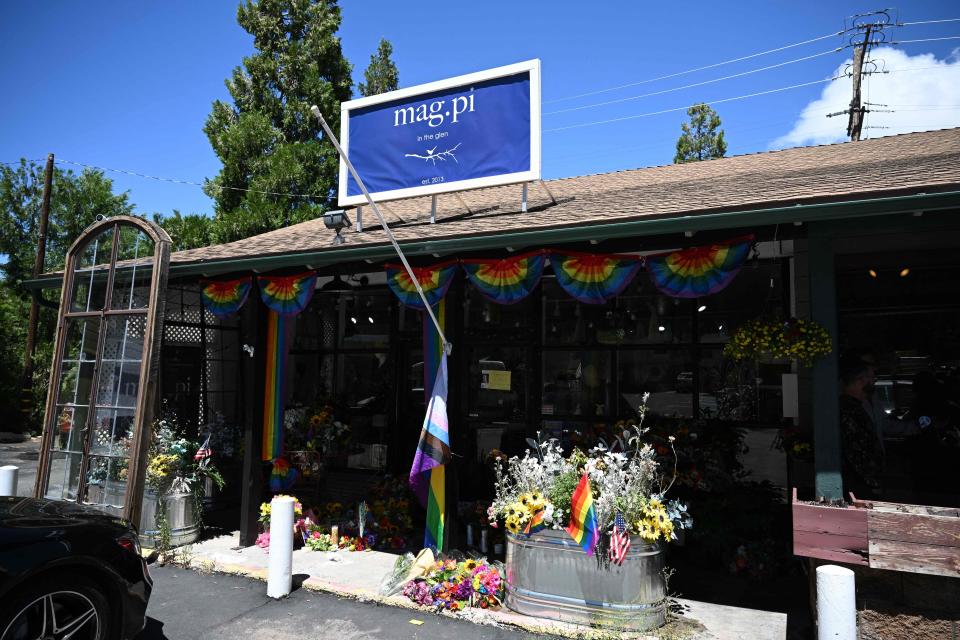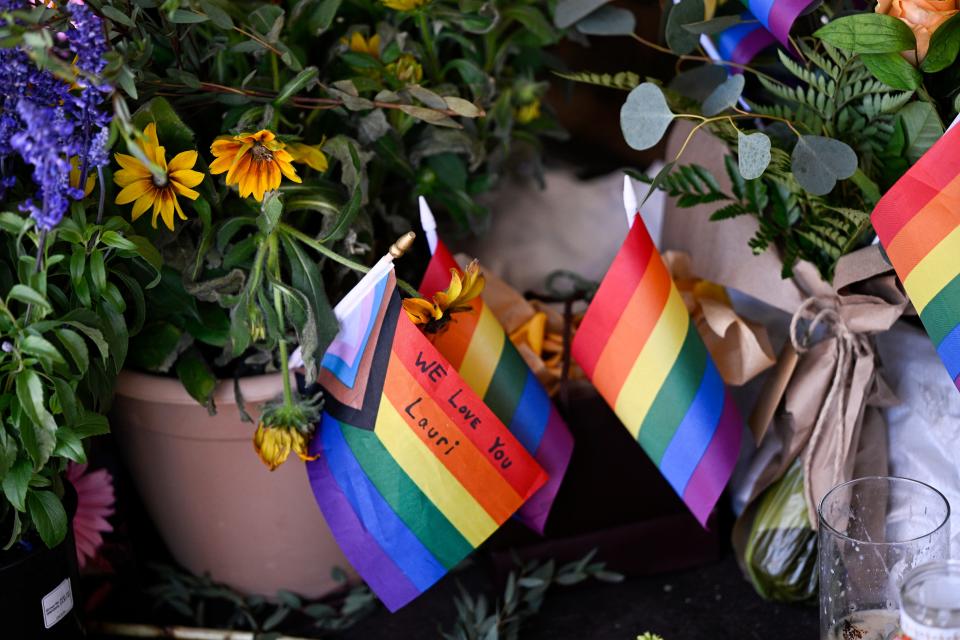In shooting over store's Pride flag, predictions of violence again become reality
For months, social media accounts under the name Travis Ikeguchi posted incessantly on social media about hatred for – and fear of – the LGBTQ+ community.
An account on X, formerly Twitter, retweeted conspiracy theories spread by far-right extremists. It mixed anti-abortion posts and Bible verses with posts equating "Pride Month" to the word "demon." One post said same-sex marriage was "at war" against family values. Another post – pinned atop the list – showed a Pride flag in flames.
Then, on Friday, authorities say, 27-year-old Ikeguchi shot and killed Laura Ann Carleton, a mother of nine – after shouting slurs and ripping down the Pride flag she flew outside her small store in the Cedar Glen neighborhood of Lake Arrowhead, a resort town in the mountains east of Los Angeles. Soon afterward, Ikeguchi was shot and killed by sheriff’s deputies not far from the store.
As shocking as the shooting was, to experts who study extremism it was also sadly predictable. It’s just the latest attack by someone apparently steeped in far-right extremist rhetoric and conspiracy theories about the LGBTQ+ community.
“Unfortunately it's really not all that surprising, given what we've been seeing in terms of anti-LGBTQ+ rhetoric,” said Sarah Moore, an anti-LGBTQ+ extremism analyst for the Anti-Defamation League and GLAAD. “Online hate doesn't just exist in a vacuum ? it's not just going to stay online ? in fact it often turns into real-world action.”

Ten months ago, Moore’s position at the ADL didn’t exist. It was specifically created to address the rising tide of hatred and attacks against the LGBTQ+ community.
Exclusive: Threats are on rise across US, new data shows
Anti-LGBTQ+ attacks
The LGBTQ+ community has been the primary focus of far-right extremists for at least the past two years.
Groups including the street gang the Proud Boys and far-right and white supremacist influencers have become increasingly obsessed with LGBTQ+ issues. The talking points focus on all-ages drag shows, medical treatment for transgender people, and banning books that talk about sexuality.
Extremists have resurfaced tropes like calling LGBTQ+ people “groomers” and pedophiles who are preying on children.
As far-right influencers and their acolytes spread these messages on social media and in video, the online hate has also spilled into the streets.
Drag shows found themselves the target of white supremacists and other far-right extremists. Police officers have had to break up scuffles outside Pride events across the country between white supremacists and allies of the LGBTQ+ community.
Last June in Idaho, 31 members of the white supremacist group Patriot Front were arrested traveling in a U-Haul en route to disrupt a Pride event in Coeur d’Alene. They were charged with conspiracy to riot; some have since been convicted.
Last August in Texas, armed anti-fascists showed up at a drag show to protect performers and patrons from an organized right-wing protest, triggering a wave of claims that “antifa” had taken over the town.
In November, an Oklahoma donut shop that had hosted all-age drag shows was firebombed.
Later that month, an attacker shot and killed five people at an LGBTQ-friendly bar in Colorado Springs, Colorado. The shooter was sentenced to more than 2,000 years in prison in June.
Law enforcement agencies have taken note.
Earlier this year, the Department of Homeland Security issued a bulletin warning that members of the LGBTQ+ community were likely targets of domestic extremism. Less than a week later, an Ohio white supremacist was arrested for firebombing a church that was due to host a drag event.
The ADL and GLAAD tallied at least 356 incidents of anti-LGBTQ hate and extremism in the United States from June 2022 to April 2023.
“LGBTQ+ people and their allies everywhere are once again reminded in the worst possible way of the very real threat of hate and violence they face every day,” Wendy Via, co-founder of Global Project Against Hate and Extremism, wrote in a statement. “The killing of Laura Ann Carleton proves anti-LGBTQ+ hate and violence are out of control in the U.S. and around the world.”
In Colorado: Club Q attack no surprise for extremism experts who saw looming threat, decades-old pattern
What happened in Lauri Carleton shooting
During his attack in Lake Arrowhead, Ikeguchi tore down a Pride flag hanging outside the store and shouted homophobic slurs at Carleton, local police said in a briefing Monday.

The suspect was confronted by sheriff’s deputies about a mile from Mag.Pi, Carleton’s store, authorities said. He opened fire at the deputies, hitting several vehicles, and deputies returned fire, killing him, they said. The incident is being investigated.
A spokesperson for the San Bernardino County Sheriff’s Department told USA TODAY Ikeguchi had posted content critical of the LGBTQ+ community on his social media accounts before Friday’s shooting. The department did not confirm or deny whether the social media accounts in Ikeguchi’s name viewed by USA TODAY were created by the suspected gunman.
An LGBTQ+ group in Lake Arrowhead said Carleton, who went by Lauri, didn’t identify as a member of the LGBTQ+ community but spent time helping and advocating for everyone.
Are extremist groups talking about Lake Arrowhead suspect?
After past incidents of anti-LGBTQ violence, far-right commentators and influencers have often been quick to invent alternative narratives about what happened.
Occasionally, the far right will condemn such shootings, or at least seek to distance the events from their anti-LGBTQ political rhetoric.
This time, however, the extremist ecosystem remained seemingly quiet about the Cedar Glen shooting. A USA TODAY review of dozens of extremist and far-right accounts on the secure messaging app and extremist hotbed Telegram found no mentions of Ikeguchi or the shooting by late Tuesday.
Jared Holt, a senior researcher at the Institute for Strategic Dialogue, agreed that the response to the shooting from the usual far-right channels has been muted. Holt said he hasn’t seen the usual attempts to frame the shooting as an “inside job” aimed at discrediting the far right or as an attack committed by someone who is really an anti-fascist rather than a far-right extremist.
“If they're not going to try to discredit it, or use it for some sort of narrative gain, they would just as soon ignore it,” Holt said. “It's hard to imagine a really clear gain they would have by trying to do reality-denial on a situation that is just so black-and-white.”
Pride flag at August 21 Mag Pi shooting
Kasey Suffredini, interim senior vice president of prevention for The Trevor Project, a mental health organization for LGBTQ+ young people, said it was a shame that of all things, a Pride flag appears to have been at the center of last week’s shooting.
“The rainbow flag is a symbol of hope and community for LGBTQ people,” Suffredini wrote in an email to USA TODAY. “Knowing that an ally was targeted for violence because she wanted to spread that message breaks our hearts, but not our resolve."
And while an attack naturally generates new fears, Moore said the community will draw on the resilience that has strengthened it during decades of harassment.
“We are not going to allow ourselves to go backwards,” Moore said. “We're going to stand strong in the face of this.”
This article originally appeared on USA TODAY: Before Pride flag shooting, anti-LGBTQ online posts warned of 'war'
